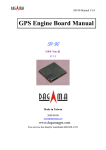Download ZyCast SG-289 User`s guide
Transcript
USER’S GUIDE SG-289 V1.1 ZyCast Technology Inc. No. 33, Lane 181, Chung Hwa Road Section 4, Hsin Chu, Taiwan Tel:+886-3-5400949 Fax:+886-3-5400413 E-mail: [email protected] http://www.zycast.com.tw ZyCast Contents 1. Introduction ………………………………………………………..…………. 2 1.1 Overview ……………………………………………………………………2 1.2 Features ………………………………………………………………..… 2 1.3 Electrical Characteristics 2. Hardware ………………………………………………. 3 ……………………………………………………………………… 4 2.1 Dimension …………………………………………………………………. 4 2.2 Accessories …………………………………………………………..……… 4 2.3 Description …………………………………………………………...…..… 5 3. Operation ……………………………………………………………………… 9 3.1 Getting Start …………………………………………………………………. 9 3.2 GPS Viewer for Testing 3.3 Function 3.4 Navigation ………………………..…………………………… 11 ……………………………………………………………………… 11 …………………………………………………………………….. 11 3.5 Data Usage …………………………………………………………………….. 12 4. Warranty ……………………………………………………….…………… 14 Appendix: Software Specification …………………………………….. 15 Appendix: Time Zone Table …………………………………………….. 24 SG-289 User’s Manual v1.1 1 ZyCast 1. Introduction 1.1 Overview The ZyCast SG-289 Data Logger GPS Receiver is a LCD Display device providing solution with Bluetooth, UART interface and built-in rechargeable battery for high sensitivity to tracking signal. The SG-289 receiver incorporates a high sensitivity SiRF StarⅢ chipset for GPS signal acquisition and tracking. The SiRF StarⅢ chipset is with extremely high sensitivity for GPS signal acquisition and tracking. This Bluetooth GPS receiver allows you to receive GPS data on mobile hand-held devices. By sending the GPS data wirelessly, you may place this receiver on a position with best signal reception without the constraint of annoying wires. The receiver is equipped with a portable, rechargeable, with removable battery, just like a mobile phone. The receiver is very suitable for broad applications such as vehicle navigation, mapping, surveying, security, agriculture, etc. Only a clear view of sky and a battery power are necessary to the unit. With its low power consumption, the receiver tracks up to 20 satellites at a time while offering fast time-to-first-fix, re-acquires satellite signals less than 1 second (average) and updates position data every second. The device is with SD card supported for data recording in text file. 1.2 Features The SG-289 provides a host of features that make it easy for integration and use. With SiRF StarⅢ high sensitivity chipset. High sensitivity and high performance receiver tracks up to 20 satellites. High speed signal acquisition using 200,000 time/frequency search channels. Built-in WAAS/EGNOS demodulator without additional hardware. With the highly sensitive software to get the fast acquisition and reacquisition in the urban, canyon and foliage environments. 6. Equipped with Li-ion rechargeable battery for long operating hours. 7. Over temperature protection for the battery. 8. Compatible with Bluetooth devices with Serial Port Profile (SPP). 9. Built-in high gain antenna. 10. Three LEDs show Bluetooth, GPS, and battery status. 11. LCD Display shows time, longitude, latitude, elevation, etc. 12. SD/MMC card supported for data storage in text file. 1. 2. 3. 4. 5. 13. Supports standard NMEA-0183 data protocol and SiRF binary code at 19200 baudrate. 14. Built-in rechargeable battery for memory and RTC backup and for fast TTFF. 15. Flash-based program memory, new software revisions upgradeable through serial interface. 16. Compact and sleek design ideal for portable applications. SG-289 User’s Manual v1.1 2 ZyCast 1.3 Electrical Characteristics General Frequency C/A code Channels Antenna Sensitivity Tracking Accuracy Position L1, 1575.42 MHz 1.023 MHz chip rate 20 channels all in view tracking internal -159 dBm typical Time < 10 meters, 2D RMS < 7 meters 2D RMS, WAAS corrected 1-5 meters, DGPS corrected 1 microsecond synchronized to GPS time Default WGS-84 Datum Acquisition Rate (Open Sky) Hot start Warm start Cold start Reacquisition 1 sec, average 38 sec, average 42 sec, average 0.1 sec, average Dynamic Conditions Protocol message NMEA-0183 Default NMEA Altitude Velocity Acceleration Jerk GPS protocol < 18,000 meters (60,000 feet) < 515 meters/sec (1,000 knots) <4G 20 meters/sec max GGA, GSA, GSV, RMC, 19200 baudrate, (GLL, VTG, and ZDA optional) 8 bits data, 1 stop bit, no parity. Bluetooth Characteristics BT Compliant RF Tx Power Receiver sensitivity Communication distance Communication profile Version1.1 Class 2 (4 dBm max) -80 dBm with BER<0.1% 10 meter typically Serial Port Profile (SPP) Power Consumption Main power input Operation Current 5.0 ± 5% VDC input 75 mA average in normal mode SG-289 User’s Manual v1.1 3 ZyCast Battery Source Charging time Operation time Rechargeable and removable1200 mAh Lithium-ion battery with 5V DC input charging circuit Fully charged 2.5 hours typical 12 hours after fully charged in continuous tracking mode Environmental Characteristics Operating temperature range Storage temperature range Charging temperature range Operating humidity: -10 oC to +60 oC -20 oC to +70 oC 0 oC to +45 oC 5% to 95%, no condensing Dimension 93.1 mm (L) x 45.7 mm (W) x 22.8 mm (H) Weight <70 g (Battery & SD/MMC Card not included) 2. Hardware 2.1 Dimension The receiver enclosure is with the dimension: 93.1 mm (L) x 45.7 mm (W) x 22.8 mm (H) 2.2 Accessories 1, 2, 3, 4, 5, A 1200 mAh Lithium-ion rechargeable battery. A vehicle lighter adapter assembly for battery recharge. A household power adaptor assembly for battery recharge. A USB cable assembly with “A” plug to mini USB plug. User manual and CD. SG-289 User’s Manual v1.1 4 ZyCast 2.3 Description 1, Body of the Bluetooth GPS unit is as shown in the figure. There are three LED windows on the front cover to indicate the GPS, Bluetooth and battery status. One LCD display panel on the front cover shows time, longitude, latitude, height, speed, battery status, SD/MMC Card, and satellite signal status. Detailed LED and LCD indications are described in next paragraph. The battery on/off switch and SD/MMC card slot are located on the same broadside of the body. The mini USB port for charging the battery is on the down side of the body. 2, LED status SG-289 User’s Manual v1.1 5 ZyCast Remark: Battery charging suspended (protection when charging overtime or battery overheat) Unplug the power plug and wait for a moment to resume charging. 3, LCD Indication The LCD display panel shows the following message: L Please put a SD/MMC card in the slot before turning on the device. The SD/MMC card should be formatted to FAT file system. SG-289 User’s Manual v1.1 6 ZyCast 4, 5, Bluetooth/Backlight usage (The default of Bluetooth/Backlight is ON.) 1. Under normal operation status, press button “A” for 1 second and then release to turn off/on Backlight. 2. Under normal operation status, press button “B” for 1 second and then release to turn off/on Bluetooth. LUnder Recorder USER mode, the Bluetooth ON/OFF setting function will be disabled. If you want to turn on/off Bluetooth under USER mode, please use Bluetooth setup described in 5. Display Setup below. Display Setup (Please refer to Appendix: Time Zone Table for time zone adjustment.) 1. Press button “A” for 2 seconds then release to enter into setup menu. 2. Press “Select” for 1 second to increase the parameter figure. 3. Press “Next” for 1 second to select different parameters. 4. After finishing setup, press “Exit” for 1 second to back to operation status. LWhenever setting up, the power of the device must be turned off then on again to reactivate the signal. SG-289 User’s Manual v1.1 7 ZyCast 6, SD/MMC Recorder Setup (The default of Recorder is AUTO.) 1. 2. 3. 4. Press Button “B” for 2 seconds then release to enter SD/MMC recorder setup function Press “Select” for 1 second to increase the parameter figure. Press “Next” for 1 second to select different parameters. Under USER mode, the Bluetooth ON/OFF setting function will be disabled. Press button “B” for 1 second to record, recording once per press button. 5. Under AUTO mode, the recording is as follows: Speed Record 0 Km/h No record Under 10 Km/h Record once per 2 seconds Under 40 Km/h Record once per 5 seconds Under 70 Km/h Record once per 8 seconds Under 100 Km/h Record once per 10 seconds Over 100 Km/h Record once per 20 seconds LWhenever setting up, the power of the device must be turned off then on again to reactivate the signal. SG-289 User’s Manual v1.1 8 ZyCast 3. Operation 3.1 Getting Start Step 1: Battery Installation (a) Slide the power switch to “OFF” position. (b) Press the “PUSH” button then slide the bottom cover off. (c) Insert the Li-ion battery into the compartment. Note the orientation of the battery. (d) Slide the bottom cover back to locked condition. Step 2: Charge Please charge the battery to full capacity when first time to use. mini USB jack, as shown in the following figure. Connect the attached adaptor cord to the SG-289 User’s Manual v1.1 9 ZyCast The battery indication is with dual-color LEDs. The green LED will be on until charge completes. The LED indication for the battery status is described in the following. Battery low ----------------------------------------------------------------- Red LED flashing Battery in charging -------------------------------------------------------- Green LED steady on Battery charging suspended (protection when charge timer over or battery overheat) ----------------- Green LED flashing Charge completes or battery in normal capacity ---------------------- both LEDs off Step 3: GPS acquisition Turn the power switch “on.” The slide switch is on the broadside of the body. on, both the Bluetooth and GPS indication LEDs start to flash. Once the power is turned Take the Bluetooth GPS to places with clear view of the sky. The Red LED indicates the status. (a) LED steady on when power is connected and for the initial acquisition process; (b) LED flashes at 1 second on and 1 second off when the receiver outputs position fix data. Step 4: Wireless Link Turn on the host device, a PDA or a NB with Bluetooth function. Then execute Bluetooth manager program to perform “search” and “pair” procedures. The default PIN code is “0000” for host devices to access this BT GPS unit (in paired mode). The Blue LED indicates following Bluetooth radio status. (a) LED flashes at 3 seconds interval for standby mode; (b) LED flashes at 0.2 second interval for pairable mode; (c) LED flashes at 1 second interval if there is an active RF link. SG-289 User’s Manual v1.1 10 ZyCast 3.2 GPS Viewer for Testing Install a GPS Viewer program to host device. You may check the status of the GPS receiver whenever you like to. Following are standard buttons and operation steps. (a) Execute the Viewer program. Press the “Com Port:” button to set “Com Port” for this data link and the “Baudrate” to any one of 2400, 4800, 9600, 19200, 38400… (b) Click “Start” to receive data. Usually a window shows the NMEA format data stream while another window shows tracked satellites signal quality. (c) Once the link is successful, click “Stop” button to stop the program. However, you may click, for example, the “Cold Start” button to perform “cold start” testing. 3.3 Function As soon as the power on, the SG-289 Bluetooth GPS receiver begins the process of satellite acquisition, tracking, and Bluetooth radio connection. Under normal circumstances, it takes around 42 seconds (average) to achieve a position fix at the first time. After a position fix has been calculated, information about valid position, velocity, and time is transmitted over the output channel. The SG-289 Bluetooth GPS receiver utilizes initial data, such as last stored position, date, time and satellite orbital data, to achieve maximum acquisition performance. If significant inaccuracy exists in the initial data or the orbital data is obsolete, it may take more time to achieve a navigation solution. 3.4 Navigation After the acquisition process is complete, the SG-289 Bluetooth GPS receiver sends valid navigation information over output channels. These data include: 1) Latitude/longitude/altitude 2) Velocity 3) Date/time 4) Error estimates 5) Satellite and receiver status SG-289 User’s Manual v1.1 11 ZyCast 3.5 Data Usage The device is with SD card supported for data recording in text file. The data can be used as following ways: 1. Save the files in your computer, then read the text file directly to know the GPS messages, such a s latitude, longitude, velocity, altitude, date, time, etc. 2. Use ZyCast GPS Viewer play mode to replay text data file. 2.1 Open ZyCast GPS Viewer 2.2 Choose Play Mode 2.3 Setting play speed 2.4 Press Start button to choose the text file 2.5 Please see following picture for a data-playing example. SG-289 User’s Manual v1.1 12 ZyCast 3. Use Google Earth to see the route. 3.1 Please search Google website, download and install Google Earth free software. Please see following example(http://earth.google.com/download-earth.html). 3.2 Convert text file into Google Earth readable file, like KML or KMZ file. Please see following free convert example(http://www.noktek.com/~gps/log2kml.htm). SG-289 User’s Manual v1.1 13 ZyCast 3.3 Execute the converted file to lunch Google earth. 3.4 Please see following picture showing drive route and time for an example. 4. Warranty The GPS smart receiver is warranted to be free from defects in material and functions for one year from the date of purchase. Any failure of this product within this period under normal conditions will be replaced at no charge to the customers. SG-289 User’s Manual v1.1 14 ZyCast Appendix: Software Specifications NMEA Protocol The SG-289 interface protocol is based on the National Marine Electronics Association (NMEA) interface specification, namely, the NMEA 0183 standard. The SG-289 is capable of supporting the following NMEA message formats specifically developed and defined by SiRF. NMEA Message Prefix Format Direction $GPGGA Time, position and fix type data. Out $GPGLL Latitude, longitude, time of position fix and status. Out $GPGSA GNSS DOP and active satellites Out $GPGSV Satellites in view. Out $GPMSS Radio beacon signal-to-noise ratio, signal strength, frequency, etc. Out $GPRMC Recommended minimum specific GNSS data. Out $GPVTG Speed and course over ground. Out $GPZDA Date and time. Out General NMEA Format The general NMEA format consists of an ASCII string commencing with a ‘$’ character and terminating with a <CR><LF> sequence. NMEA standard messages commence with ‘GP’ then a 3-letter message identifier. The message header is followed by a comma delimited list of fields optionally terminated with a checksum consisting of an asterix ‘*’ and a 2 digit hex value representing the checksum. There is no comma preceding the checksum field. When present, the checksum is calculated as a bitwise exclusive of the characters between the ‘$’ and ‘*’. As an ASCII representation, the number of digits in each number will vary depending on the number and precision, hence the record length will vary. Certain fields may be omitted if they are not used, in which case the field position is reserved using commas to ensure correct interpretation of subsequent fields. SG-289 User’s Manual v1.1 15 ZyCast $GPGGA This message transfers global positioning system fix data. Following is an example. $GPGGA,161229.487,3723.2475,N,12158.3416,W,1,07,1.0,9.0,M, , , ,0000*18 The $GPGGA message structure is shown below: Field Example Message ID $GPGGA GGA protocol header. UTC Time 161229.487 hhmmss.sss Latitude 3723.2475 ddmm.mmmm N/S Indicator N N=north or S=south. Longitude 12158.3416 dddmm.mmmm E/W indicator W E=east or W=west. Position Fix Indictor 1 0: Fix not available or invalid. 1: GPS SPS mode, fix valid. 2: Differ. GPS, SPS mode, fix valid 3-5: Not supported. 6: Dead Reckoning Mode, fix valid. (1) Satellites Used 07 Number of satellites used to calculate fix. Range 0 to 12. HDOP 1.0 Horizontal Dilution of Precision. MSL Altitude (2) 9.0 Meter Altitude above mean seal level. M Meter M stands for “meters”. Meter Separation from Geoids can be blank. Units Meter M stands for “meters”. Age of Diff. Corr. Second Age in seconds. Blank (Null) fields when DGPS is not used. Units Geoid Separation (2) Diff Ref. Station ID 0000 Checksum *18 Unit <CR> <LF> Notes Message terminator. (1) Only apply to NMEA version 2.3 (and later) in this NMEA message description. (2) SiRF does not support geoid corrections. Values are WGS84 ellipsoid heights. SG-289 User’s Manual v1.1 16 ZyCast $GPGLL This message transfers geographic position, latitude, longitude, and time. Following is an example. $GPGLL,3723.2475,N,12158.3416,W,161229.487,A,A*41 The $GPGLL message structure is shown below: Field Example Unit Message ID $GPGLL GLL protocol header. Latitude 3723.2475 ddmm.mmmm N/S Indicator N N=north or S=south. Longitude 12158.3416 dddmm.mmmm E/W indicator W E=east or W=west. UTC Time 161229.487 hhmmss.sss Status A A: Data valid or V: Data invalid. Mode A A=Autonomous, D=DGPS, E=DR (Only present in NMEA version 3.00). Checksum *41 <CR><LF> Notes Message terminator. SG-289 User’s Manual v1.1 17 ZyCast $GPGSA This message transfers DOP and active satellites information. Following is an example. $GPGSA,A,3,07,02,26,27,09,04,15, , , , , ,1.8,1.0,1.5*33 The $GPGSA message structure is shown below: Field Example Message ID $GPGSA GSA protocol header. Mode A M: Manual, forced to operate in selected 2D or 3D mode. A: Automatic switching between modes. Mode 3 1 2 3 Satellites Used (1) 07 SV on channel 1. (1) 02 SV on channel 2. Satellites Used Unit Notes Fix not available. 2D position fix. 3D position fix. … .. Satellites Used (1) SV on channel 12. PDOP 1.8 HDOP 1.0 VDOP 1.5 Checksum *33 <CR> <LF> Message terminator. (1) Satellites used in solution. SG-289 User’s Manual v1.1 18 ZyCast $GPGSV This message transfers information about satellites in view. The $GPGSV message structure is shown below. Each record contains the information for up to 4 channels, allowing up to 12 satellites in view. In the final record of the sequence the unused channel fields are left blank with commas to indicate that a field has been omitted. Following is an example. $GPGSV,2,1,07,07,79,048,42,02,51,062,43,26,36,256,42,27,27,138,42*71 $GPGSV,2,2,07,09,23,313,42,04,19,159,41,15,12,041,42*41 The $GPGSV message structure is shown below: Field Example Unit Notes Message ID $GPGSV GSA protocol header. Number of messages (1) 2 Number of messages, maximum 3. Message number 1 Sequence number, range 1 to 3. Satellites in view 07 Number of satellites currently in view. Satellite ID 07 Channel 1, ID range 1 to 32. Elevation 79 degree Elevation of satellite, maximum 90. Azimuth 048 degree Azimuth of satellite, range 0 to 359. SNR (C/N0) 42 dBHz Range 0 to 99, null when not tracking. Satellite ID 02 Elevation 51 degree Elevation of satellite, maximum 90. Azimuth 062 degree Azimuth of satellite, range 0 to 359. SNR (C/N0) 43 dBHz Range 0 to 99, null when not tracking. Satellite ID 26 Elevation 36 degree Elevation of satellite, maximum 90. Azimuth 256 degree Azimuth of satellite, range 0 to 359. SNR (C/N0) 42 dBHz Range 0 to 99, null when not tracking. Satellite ID 27 Elevation 27 degree Elevation of satellite, maximum 90. Azimuth 138 degree Azimuth of satellite, range 0 to 359. SNR (C/N0) 42 dBHz Range 0 to 99, null when not tracking. Checksum *71 Channel 2, ID range 1 to 32. Channel 3, ID range 1 to 32. Channel 4, ID range 1 to 32. <CR> <LF> Message terminator. (1) Depending on the number of satellites tracked multiple messages of GSV data may be required. SG-289 User’s Manual v1.1 19 ZyCast $GPMSS This message transfers information about radio beacon signal-to-noise ratio, signal strength, frequency, etc. Following is an example. $GPMSS,55,27,318.0,100,1,*57 The $GPMSS message format is shown below. Field Example Unit Notes Message ID $GPMSS Signal Strength 55 dB SS of tracked frequency. Signal-to-Noise Ratio 27 dB SNR of tracked frequency. Beacon Frequency 318.0 kHz Currently tracked frequency. Beacon Bit Rate 100 Bits per second. Channel Number (1) 1 The channel of the beacon being used if a multi-channel beacon receiver is used. Checksum *57 MSS protocol header. <CR> <LF> Message terminator. (1) Fields marked in italic red apply only to NMEA version 2.3 (and later) in this NMEA message description. SG-289 User’s Manual v1.1 20 ZyCast $GPRMC This message transfers recommended minimum specific GNSS data. Following is an example. $GPRMC,161229.487,A,3723.2475,N,12158.3416,W,0.13,309.62,120598, ,*10 The $GPRMC message format is shown below. Field Example Message ID $GPRMC RMC protocol header. UTC Time 161229.487 hhmmss.sss Status A A: Data valid or V: Data invalid. Latitude 3723.2475 ddmm.mmmm N/S Indicator N N=north or S=south. Longitude 12158.3416 ddmm.mmmm E/W indicator W E=east or W=west. Speed over ground 0.13 knot Speed over ground Course over ground 309.62 degree Course over ground Date 120598 Magnetic variation (1) Unit ddmmyy, current date. degree Mode (2) A Checksum *10 Not used. A=Autonomous, D=DGPS, E=DR. <CR> <LF> (1) SiRF does not support magnetic declination. Notes Message terminator. All “course over ground” data are geodetic WGS84 directions. (2) Fields marked in italic red apply only to NMEA version 2.3 (and later) in this NMEA message description. SG-289 User’s Manual v1.1 21 ZyCast $GPVTG This message transfers velocity, course over ground, and ground speed. Following is an example. $GPVTG,309.62,T, ,M,0.13,N,0.2,K,A*23 The $GPVTG message format is shown below. Field Example Message ID $GPVTG Course (true) 309.62 Reference T Course (magnetic) Reference (1) Units N Speed 0.2 Mode (2) Checksum degree Measured heading T = true heading Measured heading M = magnetic heading (1) M 0.13 Notes VTG protocol header. degree Speed Units Unit knot Speed in knots N = knots km/hr Speed K K = km/hour. A A=Autonomous, D=DGPS, E=DR. *23 <CR> <LF> (1) SiRF does not support magnetic declination. Message terminator. All “course over ground” data are geodetic WGS84 directions. (2) Fields marked in italic red apply only to NMEA version 2.3 (and later) in this NMEA message description. SG-289 User’s Manual v1.1 22 ZyCast $GPZDA This message transfers UTC Time and Date. Following is an example. $GPZDA,181813,14,10,2003,00,00*4F The $GPZDA message format is shown below. Field Example Unit Message ID $GPZDA ZDA protocol header. UTC Time 181813 Either using valid IONO/UTC or estimated from default leap seconds. UTC Day 14 01 to 31, day of month. UTC Month 10 01 to 12. UTC Year 2003 1980 to 2079. Local zone hours 00 Offset from UTC (set to 00). Local zone minutes 00 Offset from UTC (set to 00). Checksum *4F <CR> <LF> Notes Message terminator. SG-289 User’s Manual v1.1 23 ZyCast Appendix: Time Zone Table Time Zone Name Coordinated Daylight Saving Universal Time Time Eniwetok, Kwajalein -12 Midway Island, Samoa -11 . Hawaii -10 . Alaska -9 -8 Pacific Time (US and Canada); Tajuana -8 -7 Mountain Time (US and Canada), Chihuahua, La Paz, Mazatlan, Arizona -7 -6 Central Time (US and Canada), Saskatchewan, Guadalajara, Mexico City, Monterrey, Central America -6 -5 Eastern Time (US and Canada), Indiana (East), Bogota, Lima, Quito -5 -4 Atlantic Time (Canada), Caracas, La Paz, Santiago -4 Newfoundland -3.5 -2.5 Brasilia, Buenos Aires, Georgetown, Greenland -3 . Mid-Atlantic -2 Azores, Cape Verde Islands -1 Greenwich Mean Time: Dublin, Edinburgh, Lisbon, London, Casablanca, Monrovia +0 +1 Amsterdam, Belgrade, Bratislava, Budapest, Ljubljana, Prague, Sarajevo, Skopje, Warsaw, Zagreb, Brussels, Copenhagen, Madrid, Paris, Berlin, Bern, Rome, Stockholm, Vienna, West Central Africa +1 +2 Athens, Istanbul, Minsk +2 +3 Bucharest, Cairo, Pretoria, Jerusalem, Harare, Pretoria +2 +3 Helsinki, Riga, Israel, Kyiv, Sofia, Tallinn, Vilnius +2 +3 Baghdad, Kuwait, Riyadh, Nairobi +3 +4 Moscow, St. Petersburg, Volgograd +3 +4 +3.5 +4.5 Tehran SG-289 User’s Manual v1.1 24 ZyCast Coordinated Daylight Saving Universal Time Time +4 . +4.5 . +5 . Bombay, Calcutta, Madras, New Delhi, Chennai, Kolkata +5.5 . Almaty, Dhaka, Colombo, Astana, Sri Jayawardenepura, Novosibirsk +6 . Bangkok, Hanoi, Jakarta, Krasnoyarsk +7 . Beijing, Changqing, Hong Kong, Uramqi +8 . Perth, Singapore, Taipei, Beijing, Chongqing, Hong Kong SAR, Kuala Lumpur, Irkutsk, Ulaan Bataar +8 . Osaka, Sapporo, Tokyo +9 . Seoul, Yakutks +9 . Adelaide, Darwin +9.5 . Brisbane, Guam, Port Moresby +10 . Canberra, Melbourne, Sydney +10 . Hobart, Vladivostok +10 . Magadan, Solomon Islands, New Caledonia +11 +12 Auckland, Wellington +12 . Fiji Islands, Kamchatka, Marshall Islands +12 . Time Zone Name Abu Dhabi, Muscat, Baku, Tbilisi, Yerevan Kabul Ekaterinburg, Islamabad, Karachi, Tashkent *Unit: hour All Rights Reserved SG-289 User’s Manual v1.1 25



































